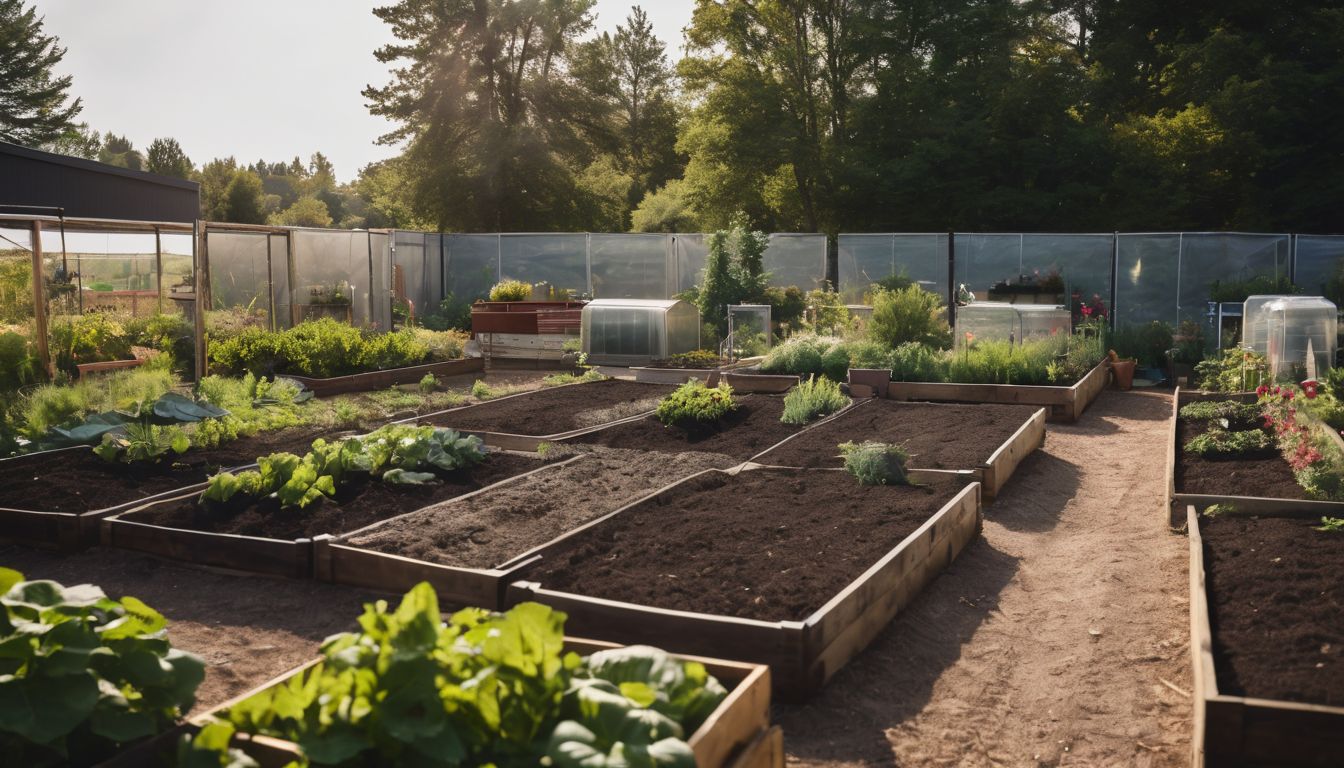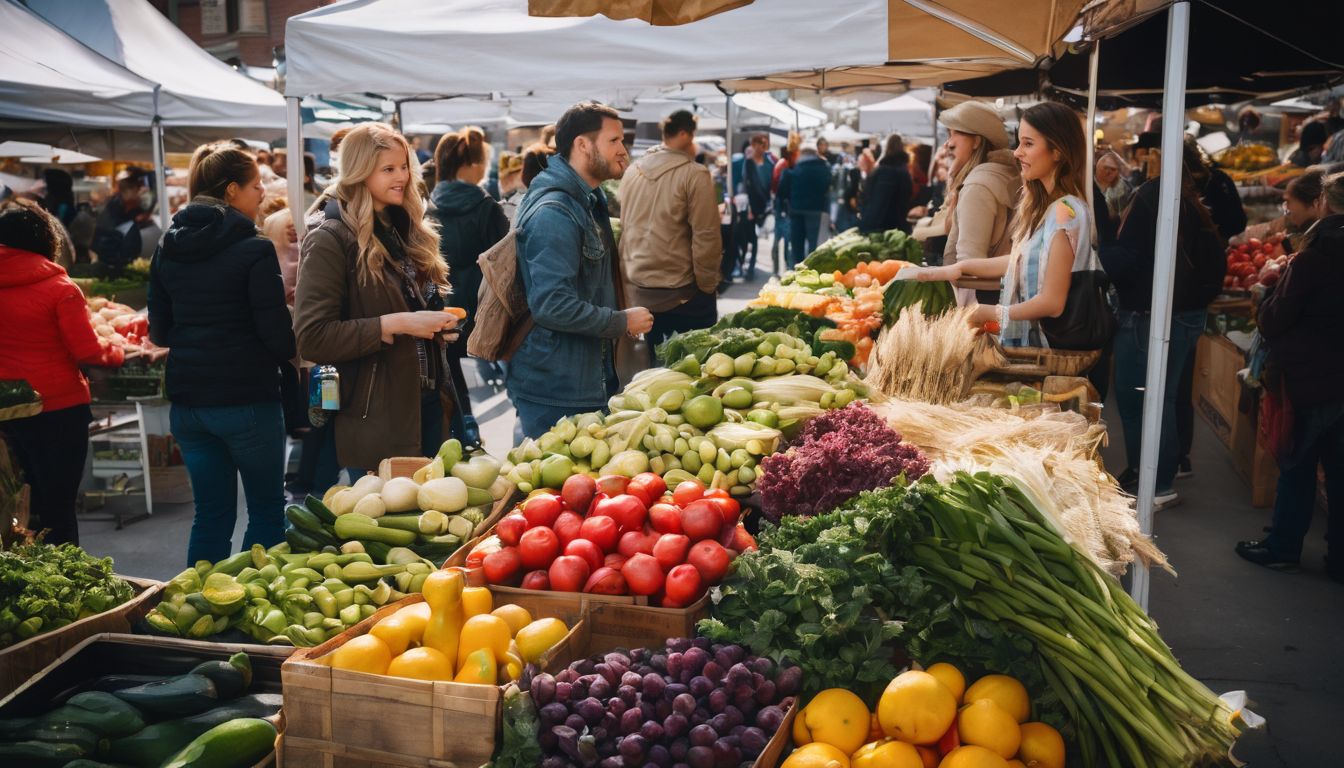Navigating the journey towards sustainable living can certainly seem like a daunting endeavour, yet you’re not alone in wanting to make a change. Indeed, it’s heartening to see that a whopping 60% of consumers are yearning to lead more eco-conscious lives.
In this article, we aim to gently guide you through the process of organising a sustainable living workshop. Such an event isn’t just about swapping tips – it’s about sharing in community spirit and taking meaningful steps together towards caring for our planet.
So join us as we explore practical ways to infuse your lifestyle with a deeper shade of green!
Key Takeaways
- To host a successful sustainable living workshop, it’s vital to choose an eco-friendly venue with recycling and energy-efficient features, and to pick topics that resonate with your audience, such as waste reduction or water conservation techniques.
- Minimise waste at your event by going paperless, encouraging the use of reusable items among participants, providing recycling bins, and serving local plant-based food; also consider investments in renewable energy sources for long-term environmental benefits.
- Personal touches like offering handmade eco-friendly take-home gifts can enhance the experience for attendees while promoting ongoing sustainability practices within the community.
- Sustainable living workshops benefit both businesses and communities by fostering environmentally responsible behaviours that contribute to economic growth and improved quality of life through better air and water quality, reduced waste production, and preservation of natural ecosystems.
- Incorporate discussions on carbon offsetting in your workshop curriculum to educate about its importance in climate change mitigation efforts; this empowers individuals to actively participate in reducing their carbon footprint.
The Importance of Community Workshops for Promoting Sustainable Living
Community workshops play a crucial role in promoting sustainable living by bringing people together to learn and collaborate on eco-friendly practices. These workshops provide a platform for sharing knowledge, building awareness, and fostering a sense of community around environmental conservation.
Definition of community workshops
Community workshops are interactive gatherings where we come together to share skills, knowledge, and ideas on a range of topics. They’re designed to be inclusive spaces where everyone from beginners to experts can learn something new about sustainable living.
Our ecofriendly practices take centre stage during these sessions, providing hands-on experiences in natural living while fostering a sense of unity around environmental conservation.
These dynamic workshops serve as an essential platform for spreading sustainability goals within the local population. We not only educate but also empower participants to make impactful changes towards a more sustainable lifestyle.
Next up, let’s explore the benefits community workshops can offer us all in our journey towards greener events and deeper community engagement.
Benefits of community workshops
Community workshops offer a platform for individuals to share knowledge and collaborate towards a common goal. They provide an opportunity for learning and skill-building, fostering a sense of empowerment within the community.
- Knowledge Sharing: Participants can exchange ideas and learn new skills related to sustainable living, such as composting techniques or energy-efficient practices.
- Collaboration: Workshops encourage teamwork and collective problem-solving, facilitating the implementation of impactful sustainability initiatives within the community.
- Networking Opportunities: Attendees can connect with like-minded individuals, forming valuable partnerships for future environmental projects.
- Empowerment: The workshops instill a sense of responsibility and agency among participants, motivating them to take meaningful actions towards environmental conservation.
- Cultivating Awareness: Community workshops raise awareness about important environmental issues and inspire individuals to adopt eco-friendly practices in their daily lives.
Organising a Successful Sustainability Workshop
When it comes to hosting a successful sustainability workshop, the key is to choose the right venue, select an engaging topic that resonates with your audience, and be prepared for what to expect on the day of the event.
These crucial steps will help ensure that your workshop is both informative and impactful.
Choosing the right venue
Selecting the right venue for our sustainable living workshop is crucial. We consider eco-friendly venues that align with our values, such as community centres, parks, or sustainable event spaces.
These locations provide a fitting atmosphere for our environmentally conscious audience and support our zero waste goals. When evaluating potential venues, we prioritise those with recycling facilities, energy-efficient lighting, and easy access to public transport to reduce carbon footprint.
We also look for spaces that accommodate interactive activities and allow us to incorporate natural elements into the workshop experience. This approach helps us create an immersive learning environment and promotes eco-conscious practices in every aspect of the event planning process.
Selecting a relevant and engaging topic
After choosing the right venue, it’s essential to focus on selecting a relevant and engaging topic for our sustainable living workshop. A well-chosen topic can attract a wider audience and spark meaningful discussions.
Key areas to consider include waste reduction strategies, water conservation techniques, eco-friendly home improvements, or sustainable consumer choices. By catering to the interests of environmentally conscious individuals, we can ensure that the workshop provides valuable insights and practical solutions that resonate with our audience.
To appeal to those supporting conservation and environmental initiatives, we will keep in mind keywords such as zero waste workshops, natural living seminars, and sustainability-focused initiatives when brainstorming topics.
Knowing what to expect
Preparing for a sustainable living workshop involves anticipating engaging discussions about eco-conscious initiatives, waste reduction strategies, and sustainable investments. Participants can look forward to learning practical tips for minimising their carbon footprint and incorporating environmentally friendly practices into their daily lives.
Sustainable workshops often include interactive activities and group discussions that encourage participants to share ideas and collaborate on solutions to environmental challenges.
Understanding what lies ahead at the sustainability workshop is essential for individuals who want to actively contribute to conservation efforts. By participating in these workshops, you can expect meaningful conversations around green living practices, which will empower you with the knowledge needed to make positive changes in your personal life and community.
Hosting a Zero Waste Workshop
Minimising waste at your sustainability workshop is essential. Consider sustainable investments, like reusable materials and eco-friendly packaging, and don’t forget to add personal touches to make the event memorable.
Tips for minimising waste
To minimise waste at your sustainable living workshop, consider these effective tips:
- Implement a paperless approach for registration and information distribution. This reduces the use of unnecessary resources and aligns with an eco-friendly event.
- Encourage participants to bring their own reusable water bottles and coffee cups to reduce single-use plastic consumption.
- Serve locally sourced, organic, and plant – based food to minimise packaging waste and promote sustainable food practices.
- Use digital or reusable signage instead of disposable posters and banners to decrease paper waste.
- Provide recycling bins for various materials such as paper, plastic, glass, and aluminium to ensure proper waste management during the event.
- Collaborate with suppliers who have sustainable packaging options for any materials or products needed for the workshop.
- Offer electronic handouts rather than printed materials to reduce unnecessary paper usage.
Sustainable investments to consider
When planning a sustainable living workshop, it’s important to consider sustainable investments that can make a meaningful impact. Here are some key investments to consider:
- Energy-efficient lighting and appliances: Upgrading to energy-efficient lightbulbs and appliances not only reduces energy consumption but also demonstrates practical sustainability measures.
- Renewable energy sources: Consider incorporating solar panels or wind turbines as part of the workshop venue to showcase renewable energy solutions.
- Water-saving fixtures: Installing low-flow taps, toilets, and showerheads can significantly reduce water usage and highlight the importance of water conservation.
- Eco-friendly materials: Utilise sustainable and recycled materials for workshop handouts, signage, and decor to promote eco-conscious practices.
- Carbon offsetting initiatives: Support carbon offset projects to compensate for any unavoidable greenhouse gas emissions associated with the workshop, demonstrating commitment to minimising environmental impact.
- Sustainable transportation options: Encourage participants to carpool, cycle, or use public transport when attending the workshop to minimise carbon emissions from travel.
- Waste reduction systems: Implement composting and recycling facilities at the venue to minimise waste generation during the event.
Incorporating personal touches
When planning a sustainable living workshop, there are numerous ways to incorporate personal touches that resonate with the audience. Utilising locally sourced materials for décor and workshop supplies can support local businesses and reduce the carbon footprint of the event.
Moreover, offering personalised take-home items such as reusable water bottles branded with sustainable messages or eco-friendly stationery adds a thoughtful touch while promoting long-term sustainability practices.
Additionally, incorporating interactive elements like group activities, discussions, or hands-on demonstrations creates an engaging and memorable experience that motivates participants to embrace sustainable living principles in their daily lives.
Impact of Sustainable Workshops
Sustainable workshops have a positive impact on the environment, businesses, and communities. Read more about how these events can make a difference in promoting sustainable living.
Benefits for the environment
Reducing our carbon footprint is a crucial benefit of hosting sustainability workshops. By educating and inspiring others to embrace eco-friendly habits, we can collectively reduce the harmful emissions that contribute to climate change.
Additionally, conservation workshops promote sustainable investments and innovations, ultimately leading to improved air and water quality.
Minimising waste through actionable tips from such events is another significant environmental advantage. These workshops encourage participants to adopt zero-waste practices in their daily lives, contributing to overall waste reduction efforts in local communities.
Positive impact on businesses and communities
Sustainable workshops have a positive impact on businesses and communities, fostering a culture of environmental responsibility that resonates throughout local areas. By embracing ecoconscious initiatives, businesses can enhance their reputation and appeal to environmentally conscious customers.
Moreover, hosting sustainability-focused events can stimulate economic growth within communities by promoting local sustainable products and services.
Communities benefit from sustainable workshops as they foster environmental awareness and action among residents. These initiatives encourage community members to adopt greener practices in their daily lives, contributing to waste reduction, water conservation, and carbon footprint minimisation.
Importance of carbon offsetting
When considering the positive impact on businesses and communities, it’s crucial to recognise the importance of carbon offsetting in the context of sustainable living workshops. Engaging in carbon offsetting allows us to balance out our carbon emissions by investing in projects that reduce or capture an equivalent amount of greenhouse gases elsewhere.
This practice plays a significant role in mitigating climate change and contributes to the overall environmental conservation efforts within our communities. By prioritising carbon offsetting as part of our sustainability-focused initiatives, we actively contribute to minimising our carbon footprint, further solidifying our commitment to eco-friendly workshops and events.
Incorporating discussions around carbon offsetting into our sustainable living workshops not only educates individuals but also empowers them to take meaningful action towards reducing their environmental impact.
Conclusion
In conclusion, hosting a sustainable living workshop can drive real change in our communities. The impact of such events extends beyond individual actions and reaches into the fabric of society.
We must continue to lead by example and empower others to make eco-friendly choices for a more sustainable future. Taking an active role in promoting environmental conservation is essential for building a healthier planet for current and future generations.
FAQs
1. What is a sustainable living workshop?
A sustainable living workshop is an event where people learn how to live in eco-friendly ways, including waste reduction and water conservation.
2. How do I find a hosting provider for an eco-friendly workshop?
Look for a hosting provider that supports environmental conservation workshops and has experience with sustainability-focused initiatives.
3. Can attending these events help reduce my carbon footprint?
Yes, by learning from carbon footprint minimisation workshops, you can adopt practices that help lower your impact on the planet.
4. Why should I consider organising a green workshop?
Organising an environmental workshop encourages community involvement in environmental protection and promotes awareness about sustainability.





